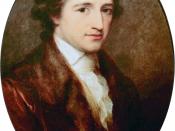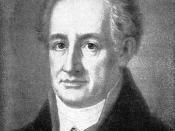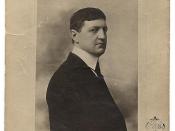The Tutor
In Lenz's comedy The Tutor, the title figure is trapped between his physicality and society's contradictory expectations. A university student in theology, Läuffer takes a position as a tutor in the home of a nobleman, the Major von Berg. He is engaged to instruct the two children of the house, Leopold and Gustchen, in academic subjects and in the social graces. To the sophisticated, Francophile wife of the major, Läuffer seems clumsy, provincial, and, in the condescending sense, bourgeois. Even more dissatisfied with the appointment is the major's brother, Privy Councillor von Berg, who scolds the young tutor's father for having suggested the arrangement.
The action of the play begins when the privy councillor's son Fritz leaves to begin his studies at the university in distant Halle. Before leaving, he and Gustchen swear eternal fidelity to each other. It proves impossible for the fickle young Gustchen to keep her word; soon, she feels abandoned.
Her pique, Läuffer's boredom, and long hours of contact lead to the inevitable liaison. When the girl discovers that she is pregnant, she and Läuffer flee to two separate hiding places. Gustchen bears her child in the forest hut of an impoverished, old, blind woman, and Läuffer finds lodgings with the simple, honest village schoolmaster, Wenzeslaus. Gustchen's melancholy descends into despair, and she is on the point of drowning herself when she is pulled from the water by Major von Berg. The distraught father has been searching for her since her disappearance. Meanwhile, blind Marthe takes the child to Wenzeslaus's schoolhouse, where Läuffer recognizes the child as his own. In a fit of guilt and depression, he castrates himself.
Throughout the action, Lenz inserts scenes from the riotous undergraduate life of Fritz von Berg and his fellow students. At the play's conclusion, Fritz returns to his family circle to forgive Gustchen and accept her child as his responsibility, while Läuffer remains in the remote village with the completely innocent Luise, who is content to be his life's companion.
The initial response to The Tutor was highly favorable, in part because the anonymously published work was thought to be the latest sensation from the pen of Johann Wolfgang von Goethe. The influence of William Shakespeare was detected in character development, in plot structure, and in the integrity of individual scenes. By 1774, the rejection of the unities of time and place by the Sturm und Drang movement was familiar to the small audience for drama in German-speaking areas. Readers and spectators had become accustomed to the use of many settings and extensive spans of time, and Lenz was able to introduce a range of empathetic characters into the epic panorama favored by the movement.
That the range itself was important to Lenz is evident in the title figure: Läuffer is not a hero whose personal crisis obscures the development of the other characters; rather, he serves as a catalyst whom forces beyond his control hurl into one web of interpersonal relationships after another. For his own family, for the von Berg family, for the teacher-pupil relationship with his charges, for the young couple, for Wenzeslaus and his pupils, for the nubile Luise and the children she will never have-for each set of interrelationships, he represents chaos and potential tragedy. His very name, which means "runner," suggests a lack of control as well as the frenetic pace of the action. The belief that social circumstance, instincts, and events themselves determine human happiness was a radical departure from Enlightenment philosophy with its naïve faith in the ultimate power of reason. Lenz takes his confrontation with the postulate of human perfectibility into the realm of the ironic by making his chaos-bringer a teacher, the very incarnation of the Enlightenment's hopes. Still, his grotesque, despairing act should not be viewed as symptomatic of complete pessimism. Lenz does have a lesson to teach; however, he is keenly aware of the obstacles in society's path.
One such obstacle is the mentality of the ruling class as represented by Major von Berg and his wife. Again, the name is significant: They act as though they are "from the mountain," lofty lords of all they survey. The woman is arrogant and supercilious; her French affectations serve only to accentuate her superficiality and stupidity. The major's one redeeming feature is his dogged devotion to his compromised daughter; otherwise, he conforms to the type of the miles gloriosus, the old braggart soldier whose greatest source of pride is his own unthinking obedience to his sovereign. His wife wants a private tutor for their children because people of rank are expected to have such a servant. The major is concerned that his son receive the amount of instruction necessary to follow in his father's footsteps. Whenever the two are together, the older man barks orders to keep the head high, the posture bolt upright. In the major and his lady, Lenz mounts a scathing critique of two major components of the upper class-the officer corps and the Frenchified lady of leisure. Yet the presence of the privy councillor indicates that the playwright was not prepared to dismiss the aristocracy as being completely without merit.
Nor was he content to give up on the teaching profession. Wenzeslaus is offered as an alternative to the half-educated, obsequious Läuffer. The village schoolmaster's dedication to his duties is made very apparent, as are the breadth and depth of his preparation. He is a solitary old bachelor who lives in rural simplicity, surrounded by books from which he loves to quote from memory-indeed, all too fluently. The price of isolation has been pedantry and self-centered ways. Still, Wenzeslaus's humanity and courage shine forth when he confronts a party of armed men who are in pursuit of the fugitive Läuffer.
The Tutor finds fault with several aspects of eighteenth century German society. The nobility supports an educational institution, the private tutor, that is actually deleterious to its children. The academic preparation and pedagogical ability of a tutor is unimportant as long as he is willing to accede to his employer's every whim. In the major, the hypermasculine loutishness of the blindly loyal officer corps is on display. In this context, what was at this point in the history of German literature a commonplace depiction of wild student life takes on added significance. The atmosphere in Halle cannot be counted on either to reform the aristocracy or to reorder society.
One major, pervasive problem is the ambivalent, and even pusillanimous worldview of the middle class. It is a tribute to the playwright's clear understanding of the complexity of the real world that he uses an aristocratic character to point out this state of affairs. The privy councillor's conversation with Läuffer's father in act 2, scene 1, is calculated to make Lenz's contemporary middle-class audience very uncomfortable. That social level prided itself on its university education. Not so secretly, it viewed itself as superior to a ruling class that was tied to a fading past and mired in superficial attitudes concerning human potential. The middle class longed for a truly meritocratic social order. Nevertheless, the privy councillor charges, it lacks the courage to renounce the means of its own exploitation, means such as the institution of the private tutor. Implicit in the critique is Lenz's belief that the stage should be used to effect change within society. His determination to remedy social ills is even more apparent in The Soldiers.
The Soldiers
The final scene of The Soldiers, Lenz's other famous comedy, offers a discussion between two characters that have previously had choral functions. A countess who has tried to avert the tragic sequence of events speaks with the colonel of the regiment served by the officers referred to in the play's title. In the course of their conversation, the playwright offers one logical solution to the social problem he has dramatized. Then, shortly after completing work on The Soldiers, Lenz wrote a short essay that contains a second possible remedy.
The action of The Soldiers is set in three garrison towns in Flanders: Lille, Armantières, and Philippeville. Marie and Charlotte are the daughters of Wesener, who sells notions and fancy goods at his shop in Lille. The beautiful Marie is about to receive a marriage proposal from Stolzius, a cloth merchant in Armantières. The very first scene shows the young woman to be quite taken with the faddish love for all things French. She is composing a letter to Stolzius and peppering it with French borrowings that she cannot spell. The innocent pretentiousness of a teenage girl sets in motion a calamitous train of events when she attracts the attention of Baron Desportes, an army officer based at Armantières. While Desportes is callous, cynical, and self-aggrandizing among his peers, he knows how to turn the head of a naïve bourgeois girl with exaggerated flattery. Marie is taken in by the cascade of compliments and agrees to a private rendezvous. Although her father is outraged at first, he soon comes to look on the nobleman's attentions as a social coup in the making for Marie and the entire family; he even suggests that she hold off Stolzius while she determines the seriousness of Desportes's intentions. Soon, Stolzius has heard of Desportes's behavior and writes a mildly monitory letter to Marie. At first the girl is upset, but Desportes soon has her laughing at her former suitor in the course of the teasing and flirting that lead to her seduction.
From this point, the playwright accelerates the action by using short scenes that switch back and forth among the three towns. The third and fourth acts together boast twenty-one scenes, several of them consisting of a single speech. Desportes's fellow officers continue to indulge themselves in transient love affairs and to evince little or no concern for the feelings of others. Stolzius sinks into a state of despair. Leaving Marie to fend for herself, Desportes steals out of Lille to avoid his creditors. The officer Mary then tries to smooth the feathers that his friend has badly ruffled. Stolzius takes a job as adjutant to Mary. Soon it is clear that Mary has designs on Marie and that she is walking the path to sorrow for a second time. The Countess La Roche tries to engage her as a lady's companion with the avowed purpose of returning Marie to a virtuous, ordered existence. Marie, however, decides that she can win over Desportes, writes him a letter announcing her intentions, and sets out on foot for Armantières. Wesener also decides to find Desportes in order to force payment of heavy debts. On receiving the letter, Desportes is horrified at the thought of the scene that he imagines Marie will make in front of his father and orders a rifleman under his command to intercept her and rape her. Soon thereafter, Desportes and Mary have a conversation at lunch about Marie, to whom Desportes refers as a "whore." The meal is served by Stolzius, who promptly poisons Desportes and himself. Meanwhile, on the road to Armantières, Wesener is accosted by a shabby, starving woman whom he takes for a prostitute. Then comes the moment of recognition as father and daughter sink into each other's arms.
The problem discussed by Countess La Roche and the regimental colonel in the final scene is the regulation that officers remain unmarried. In order to protect innocent young girls during peacetime, the colonel suggests that the army might support groups of volunteer concubines, courtesans for the officers. In the later essay, Lenz suggested instead that officers be allowed to marry and that they be integrated into society as respected burghers.
Although the plot of The Soldiers is more complex than that of The Tutor, the tragic consequences for the middle class are the same: The lives of a young woman and a young man are destroyed. In both plays, the immediate cause is amorality within the aristocracy; neither Desportes and Mary nor Major von Berg and his wife display any sense of duty to the wider community. A specific practice-the institution of the private tutor, the rule of celibacy for commissioned officers-illuminates the absence of ethics among society's elite. The high degree of pathos in The Soldiers, the addition of a decidedly anticlimactic final scene, and the composition of a follow-up essay mark Lenz as an écrivain engagé. That commitment to progressive causes does not blind him to the faults of his own victimized stratum. The audience must finally decide whether the practical remedies suggested could have saved Stolzius and Läuffer from personal calamity. Their actions do suggest a posture of passivity in the face of the immutable dictates of destiny. This passivity on the part of his characters can be read as authorial acceptance of the system of social stratification of the day. All that could be hoped for would then be some amelioration of the crueler consequences of the system. Such a reading would stand in contrast to the posture of the typical Sturm und Drang hero with his brash self-confidence, his willingness to flaunt convention. The heroes of Klinger and Friedrich Schiller may succumb to irresistible forces, but they struggle mightily to the bitter end. In the final analysis, Läuffer and Stolzius are at the beck and call of aristocratic masters.
Are the events and attitudes portrayed intended as a lesson? Lenz's immediate predecessors in the genre of comedy were Enlightenment dramatists whose typical play is structured around a foolish central character. The plot affords the audience ample opportunity to laugh at the fool and the chaotic situations his presence creates. Whether the weakness in his personality is cured at the conclusion of the play is of secondary importance. The Enlightenment's primary concern is that the spectator return home more sensitive to the dangers of one pattern of behavior, whether it be furtiveness, greed, intolerance, or hypocrisy. While the amount of death in its final scene equals that present in many a tragedy, The Soldiers is faithful to the theory of comedy set forth in the Anmerkungen übers Theater nebst angehängten übersetzten Stück Shakespears: It is a study of social institutions and the actions and situations that they generate among everyday people. At the same time, Lenz makes use of spectator expectations nurtured during the Enlightenment in his presentation of negative examples. Wesener and his wife are fools worthy of derision for placing their desire for social advancement before Marie's virtue. Marie is herself a fool on several counts: Her ambition is less reprehensible than Wesener's only because of her age. A deficient education has left her with superficial concepts of refinement and maturity. In addition, she is insensitive to the feelings of one who is close to her, and she does not learn from her mistakes. Even Stolzius is guilty of a small measure of unreasoning behavior; after all, he has chosen to attach himself to this family of fools. Still, his tragedy is almost as unavoidable as it is undeserved. In the Weseners, Lenz shows a debt to the prescriptive stage of the Enlightenment; but in Stolzius, as in Läuffer, he presents a dimension of existence that is beyond the individual's power to control. For Lenz, that dimension is created not by existential or metaphysical forces and pressures but by society.
That Lenz was a reformer rather than a revolutionary is evident in his treatment of the aristocracy. The young officers are presented in the worst possible light; however, as is the case in The Tutor, it is left to members of the aristocracy to identify the social problem and suggest solutions. Lenz was content to see caring, creative nobles such as the colonel and the Countess La Roche at the apex of the social pyramid. The Sturm und Drang movement is often linked to the wave of egalitarianism most evident in the American and French Revolutions, but nascent republicanism should not be imputed to Lenz; he was satisfied with the class structure of his time.
�Bibliography
Diffey, Norman R. Jakob Michael Reinhold Lenz and Jean-Jacques Rousseau. Bonn: Bouvier, 1981. Diffey examines the influence of Rousseau on Lenz's work. Includes bibliography.
Guthrie, John. Lenz and Büchner: Studies in Dramatic Form. New York: Peter Lang, 1984. Guthrie compares the techniques used by Lenz and Georg Büchner in their dramatic works. Includes bibliography.
Kieffer, Bruce. The Storm and Stress of Language: Linguistic Catastrophe in the Early Works of Goethe, Lenz, Klinger, and Schiller. University Park: Pennsylvania State University Press, 1986. Kieffer examines Lenz's work, along wit h that of Johann Wolfgang von Goethe, Friedrich Maximilian Klinger, and Friedrich Schiller, in the context of the Sturm und Drang movement. Includes bibliography and index.
Leidner, Alan C., and Helga S. Madland, eds. Space to Act: The Theater of J. M. R. Lenz. Columbia, S.C.: Camden House, 1993. A collection of essays about the Sturm und Drang playwright from a symposium on Lenz held at the University of O klahoma in 1991. Includes bibliography and index.
Leidner, Alan C., and Karin A. Wurst. Unpopular Virtues: The Critical Reception of J. M. R. Lenz. Columbia, S.C.: Camden House, 1999. The authors look at the critical reception of Lenz's dramatic works. Contains bibliography and in dex.
Madland, Helga Stipa. Image and Text: J. M. R. Lenz. Atlanta, Ga.: Rodopi, 1994. Madland offers an interpretation and criticism of the Sturm und Drang playwright's works. Includes bibliography and index.
O'Regan, Brigitta. Self and Existence: J. M. R. Lenz's Subjective Point of View. New York: Peter Lang, 1997. O'Regan examines the dramatic works of Lenz with an eye to his portrayal of the self and the philosophy that p ervades his works. Includes bibliography.




